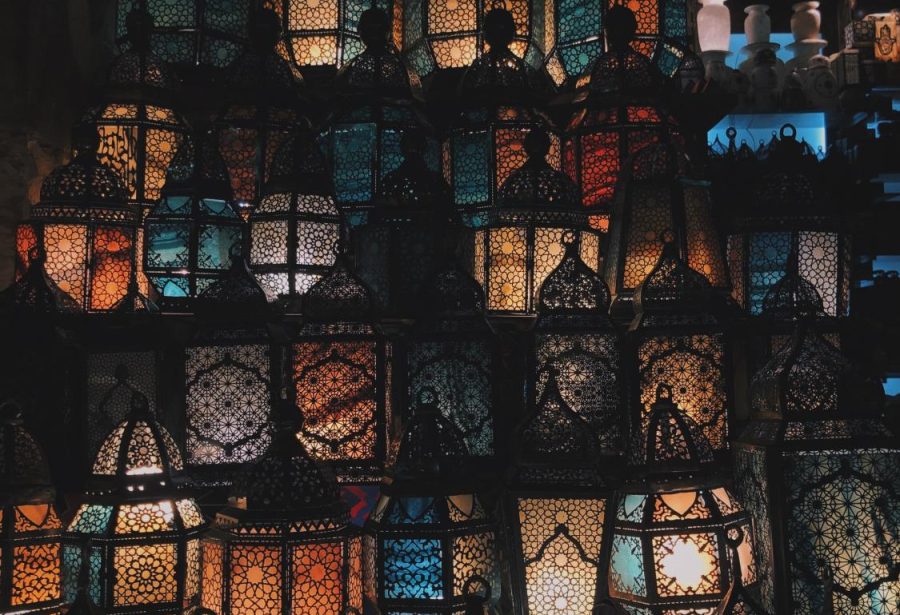All About Ramadan
May 15, 2022
Apr. 1 marked the beginning of Ramadan, the ninth month of the Muslim Calendar. This month is holy to Muslims and is a time for them to strengthen their faith. During the one month of Ramadan, it is traditional practice for Muslims to fast from dawn to sunset.
There are five pillars of Islam:
- Shahada: faith in Islam
- Salat: praying five times a day
- Zakat: donating to the needy
- Sawm: fasting during Ramadan
- Hajj: minimum one-time visit to the holy city of Mecca
There are many reasons for fasting. I spoke with Arcadia High School (AHS) senior Zayanah Rasyamond, president of the Muslim Club at AHS about Ramadan.
“Ramadan is both a cultural and spiritual month, and many people feel like they can connect with God through fasting as a constant reminder of their faith,” said Rasyamond. “It is important to me because I get to connect with family and friends through this shared experience.”
According to Vox, “The practice of fasting serves… to remind you of your human frailty and your dependence on God…so you feel compassion for (and a duty to help) the poor and needy, and to reduce the distractions in life so you can more clearly focus on your relationship with God.”
People usually start fasting once they reach puberty, which is around 14-years-old. However, nutrition expert Nazima Qureshi said, “By age 10, most kids can do the full day, if they want to.”
“When I was younger, I would fast ‘half days’, meaning I broke my fast at lunch time because I was too young to go through the whole fast,” said Rasyamond. “When I got into middle school I was able to fast the whole day each day of the month.”
Though fasting is such a huge part of Ramadan, this isn’t the only thing Muslims strive to do.
“Fasting means…also abstaining from bad habits and sins such as smoking, gambling, swearing, gossiping, arguing, fighting or being disrespectful, cruel or selfish. Sexual activity is also banned during the hours of fasting,” writes David Bentley from the Birmingham Mail.
Exceptions for fasting include elders, the ill, or women who are menstruating, pregnant, or breastfeeding. In other words, fasting during Ramadan should not be detrimental to one’s health. In fact, one can actually make up the fasting by donating food or just fasting at another time. You can learn more about this from Zakat.
Because much of the body’s energy comes from food, fasting during Ramadan can affect peoples’ daily lives, especially students who attend school. The risk of dehydration is a key factor in this.
“Physical activities do become more taxing, so it is important to conserve your energy. That being said, exercise is still possible and actually helps if you do it in moderation!” said Rasyamond. “In middle school, I did take some days off of P.E. with a written note. However, as I get older I find I am able to get through any activity, such as a four-hour dance rehearsal, even if I am fasting.”
A common misconception about Ramadan according to Rasyamond is that people think it is an unhappy time for Muslims.
“Many people think [Muslims] are forced to ‘starve themselves.’ In reality, it is very much the opposite; most of us choose voluntarily to fast and enjoy the spiritual closeness and health benefits that fasting brings us,” said Rasyamond.
After Ramadan is over, Muslims celebrate Eid-al-fitr, the first time Muslims can eat during the day. This holiday lasts one to three days, and Muslims have large feasts with family and friends.. This year, Eid-al-fitr was on May 2.
“Eid-Al Fitr is a day of festivities that usually begin with a congregational prayer, followed by delicious meals and many parties. This year, I am quite busy with school, so I will probably be partaking in the morning prayers and then going to school,” said Rasyamond. “Families visit each other bringing homemade dishes like mini potlucks, and everyone greets each other with “Eid Mubarak!”, or since we also celebrate with the Malay culture, we say “Selamat Hari Raya!”
Whether one is Muslim or not, it’s always important and beneficial to get to know different cultural events. Thank you again to Zayanah Rasyamond for taking the time to answer questions about Ramadan!
Photo by Rawan Yasser

